 Insurrection by Nina Croft
Insurrection by Nina Croft Format: eARC
Source: supplied by publisher via NetGalley
Formats available: paperback, ebook
Genres: science fiction, science fiction romance, space opera, vampires
Series: Dark Desires Origins #3
Pages: 384
Published by Entangled: Amara on October 18, 2021
Purchasing Info: Author's Website, Publisher's Website, Amazon, Barnes & Noble, Kobo
Goodreads
Malpheas is one of the most powerful demons from Earth, but when he wakes up from cryo on the other side of the galaxy, he notices something is wrong—he’s human. Oh, hell no. In order to get his powers back, he must remove the sigil on his arm by carrying out three good deeds. But acts of kindness aren’t exactly his strong suit. Working undercover as a security officer investigating a suspicious death, he’s assigned to work with Hope, the most softhearted woman he’s ever met. If she can’t teach him how to be good, no one can.
Hope is in a pot of trouble, and if anyone finds out what she did, that pot would quickly boil over. She just needs to lay low until she can figure out a way to fix this mess. But when she’s ordered to show Mal the ropes and introduce him to everyone, sorting out her problems becomes impossible. Mal is sexy as sin, broody as hell, and believes she can help him change his bad-boy ways. Fine. If that keeps him from discovering her ties to the rebellion, she’ll teach him how to be a perfect angel.
As they work together, though, it becomes clear that Hope isn’t the only one with a hidden agenda, and their irresistible attraction to each other just adds fuel to the fire. When secrets are exposed, they must make the impossible choice between doing what’s right and doing what’s necessary.
Light meets dark, good meets evil…and love can hurt like Hell.
My Review:
 At the end of Insurrection, it feels a bit like the circle just got squared. Or it feels like the series has either come to a conclusion or is headed for one. It kind of depends on whether you boarded the ship on the way to the Trakis system at the beginning of the Dark Desires Origins series in Malfunction, or whether you’ve been aboard for the whole wild ride starting at the very beginning in Break Out.
At the end of Insurrection, it feels a bit like the circle just got squared. Or it feels like the series has either come to a conclusion or is headed for one. It kind of depends on whether you boarded the ship on the way to the Trakis system at the beginning of the Dark Desires Origins series in Malfunction, or whether you’ve been aboard for the whole wild ride starting at the very beginning in Break Out.
Because at the end of Insurrection, while we aren’t exactly where we were at the opening of Break Out, we can certainly see that beginning from here. The pieces that we picked up then are just about in place now, which makes a certain kind of sense as the Dark Desires Origins series, which began with Malfunction and was followed by Deception, seems to be heading towards its conclusion here in Insurrection.
Break Out, the first book of the Dark Desires series, takes place several centuries after the events in Insurrection. Events that are so far back in the rearview mirror that they’ve taken on the patina of myths and legends – even though Rico Sanchez lived through it all, as we’ve seen in this prequel series.
But then Rico has lived through a LOT of human history – even though he is no longer exactly human himself, and hasn’t been since the Spanish Inquisition. While no one expects the Spanish Inquisition in the first place, even less do they expect to meet a vampire who began hunting the night at that same time.
The premise behind the entire Dark Desires and Dark Desires Origins series is that Earth was well on its way to becoming uninhabitable, so a fleet of sleeper ships left the dying planet for what would hopefully be greener pastures.
Or at least pastures less fucked up by humans. At least not yet.
 In the series that seems to conclude with Insurrection (I could be wrong about this being the conclusion but it feels close) we watched the maneuvering and the finagling, the bribery and the theft, as the places that should have been assigned by lottery were instead filled with the rich and the powerful. While Rico Sanchez bought, bribed or murdered his way into filling half of one ship with his own people. Not just vampires, but also shapeshifters and other things that go bump in the night, including one warlock (his story is in Deception) and one of the seven lords of the Abyss, more colloquially called Hell.
In the series that seems to conclude with Insurrection (I could be wrong about this being the conclusion but it feels close) we watched the maneuvering and the finagling, the bribery and the theft, as the places that should have been assigned by lottery were instead filled with the rich and the powerful. While Rico Sanchez bought, bribed or murdered his way into filling half of one ship with his own people. Not just vampires, but also shapeshifters and other things that go bump in the night, including one warlock (his story is in Deception) and one of the seven lords of the Abyss, more colloquially called Hell.
The demon Malpheas just so happens to be the warlock’s father. True to his demonic nature, Malpheas is used to getting his own way, reigning from the top of the heap, and killing anyone who gets in his way. In other words, he’s an entitled alphahole with the power to back it up.
Power he has been cut off from by the time Rico wakes him from cryosleep at the beginning of Insurrection. Malpheas has to commit three “good deeds”, definition rather nebulous, before he’ll have access to all his powers again. The curse he has to labor under is one last “present” from his old frenemy Lucifer.
All Mal has to do is figure out what “good” means, keep the humans on the other ships from discovering just what Rico has been hiding aboard his own ship, and plot and scheme to take over everything once he’s managed to beat the curse.
Unless Mal learns the lesson that his curse is trying to teach him, first.
Escape Rating A-: Now that I’ve finished Insurrection I have the strongest urge to go back and reread the expanded version of Break Out again. It feels so much like this story puts all the pieces in place for that one, and I want to check just how well it did.
This also feels like a great place to end the Dark Desires Origins prequel series, as we’ve seen in detail just how much the humans of the Trakis expedition brought humanity with them, very much warts and all. Readers who began this journey with Malfunction will leave Insurrection primed and ready to see where things have ended up by the time of Break Out, while readers who boarded this flight there will be sorely tempted to see how well the ends meet.
I’m not sure that readers who start here will be completely satisfied. On the other hand, their appetites may be whetted well enough to tempt them to read the entire series from start to finish!
In addition to all of the historical and human – or human-ish – pieces being put in place for the story to continue in that already explored future, one of the reasons that this story read like so much a part of the original book was that both deal explicitly with the problems not of mortality but of immortality.
The process that is discovered on Trakis Seven makes people practically immortal, just as Rico’s vampirism does. People who have gone through the process CAN be killed – decapitation is always an option – but don’t die from disease or accidents or even extreme old age.
The problem with immortality is that the human lifespan is meant to be finite. Psychologically, we need purpose and surprise and a whole bunch of other things that stop being important if one knows one literally has all the time in the universe. Time enough to have been there and done that for every possible thing one could be or do. It gets boring.
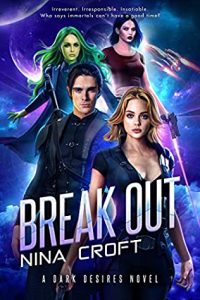 In Break Out, Rico may be a bit bored, but the people who have gone through the Trakis immortality treatment are getting really, really bored. And jaded. Just as the immortal demon, Malpheas has gotten bored and jaded with his already extremely long life.
In Break Out, Rico may be a bit bored, but the people who have gone through the Trakis immortality treatment are getting really, really bored. And jaded. Just as the immortal demon, Malpheas has gotten bored and jaded with his already extremely long life.
So the romance in this story is wrapped around Malpheas experiencing the old curse of “may you live in interesting times.” As an immortal demon with all his powers, he can make whatever and whoever he wants happen. Nothing is interesting. With his powers locked away, he’s just human. A big, strong, and very sexy human, but human nonetheless. Everything is frustrating. Everything is weird. Everything is fascinating. His times are suddenly very interesting indeed in a way that he hasn’t experienced for a very long time. For Malpheas, the curse has become a blessing.
And the biggest part of the blessing is Hope Featherstone. Not just because she’s nice and she’s pretty, but because she’s real and so are all her emotions. She may want the big, sexy beast, but she doesn’t actually like him all that much. She also finds him surprisingly resistible, and that’s something Mal has never experienced in his life. He has to become a better person to have a chance with her.
That he discovers that she’s not nearly as good as she appears makes them perfect for each other. Now they just have to survive the mess that both their secrets have gotten them into. And get themselves as far away as possible from the brave new world being established – because it’s already every bit as FUBAR’d as the old world they left behind.
Because of the situation on Trakis Four at the end of this book, this feels like the end of the Dark Desires Origins series. But it may not actually be the end. It was great fun to go back to the beginning, to see how the situation we saw in Break Out came to be, with paranormal beings from Earth flying spaceships in a far-flung corner of the galaxy. I never expected to read about vampires in space but I’m certainly glad I did.
This was a fitting sendoff for the whole thing, as not only do we see how things got to be the way they were, but the ending puts a fair amount of focus back on the character most of us fell for at the beginning, vampire and captain Rico Sanchez. It’s been an exciting ride from beginning to end, and I’m glad I took the trip.
If the author ever chooses to return to this universe I’ll be right there.

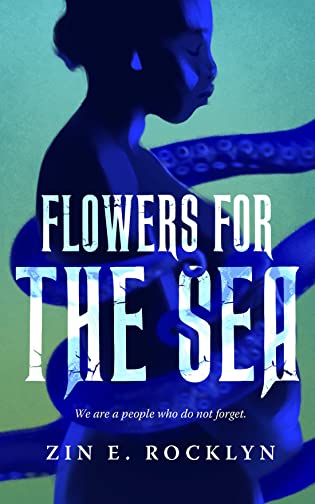 Flowers for the Sea by
Flowers for the Sea by  Escape Rating C: Even after finishing this book, I still had more of a sense of what it was supposed to be from the blurb than from reading – actually listening to – the entire thing from beginning to end. Not that the reader didn’t do a good job, because she most definitely did, but because the story didn’t quite gel for me – or perhaps it gelled in the wrong places.
Escape Rating C: Even after finishing this book, I still had more of a sense of what it was supposed to be from the blurb than from reading – actually listening to – the entire thing from beginning to end. Not that the reader didn’t do a good job, because she most definitely did, but because the story didn’t quite gel for me – or perhaps it gelled in the wrong places. Sisters of the Great War by
Sisters of the Great War by 
 Fan Fiction: A Mem-Noir: Inspired by True Events by
Fan Fiction: A Mem-Noir: Inspired by True Events by 
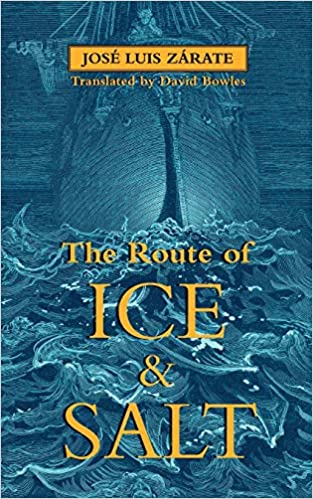 The Route of Ice and Salt by
The Route of Ice and Salt by  (If you haven’t read the original, it’s available in
(If you haven’t read the original, it’s available in Escape Rating A-: Dracula may be the entry point for this story for many readers, but the Count isn’t exactly THE point of the story. The Route of Ice and Salt is cult classic of Mexican fantasy, first published in 1998 by a small comic book publisher that didn’t survive its attempt to jump from comic books to prose. This is the first translation of the work into English, and it’s a creeping fever dream of a story that picks up on themes that were subtext in Dracula – and other early vampire stories – and moves them from subtext to explicit text.
Escape Rating A-: Dracula may be the entry point for this story for many readers, but the Count isn’t exactly THE point of the story. The Route of Ice and Salt is cult classic of Mexican fantasy, first published in 1998 by a small comic book publisher that didn’t survive its attempt to jump from comic books to prose. This is the first translation of the work into English, and it’s a creeping fever dream of a story that picks up on themes that were subtext in Dracula – and other early vampire stories – and moves them from subtext to explicit text.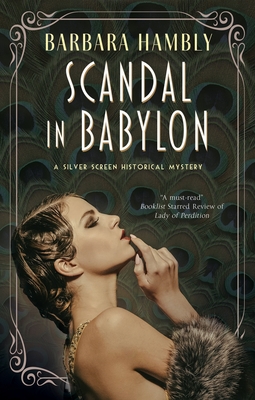 Scandal in Babylon by
Scandal in Babylon by 
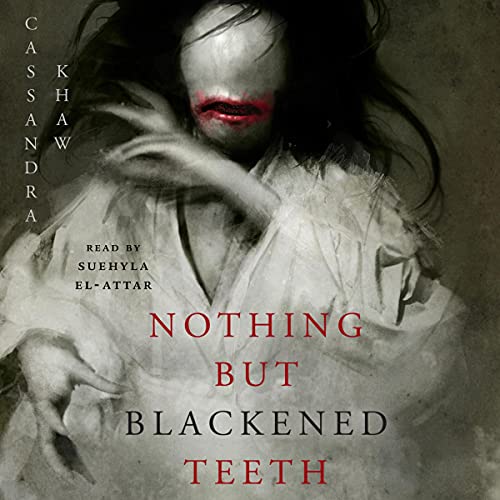 Nothing But Blackened Teeth by
Nothing But Blackened Teeth by 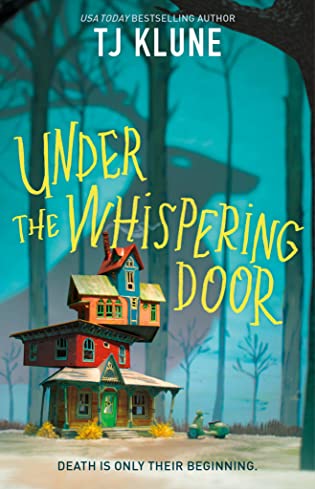 Under the Whispering Door by
Under the Whispering Door by  One final set of thoughts. This is being marketed as fantasy because of the author’s previous work in the genre, like the lovely
One final set of thoughts. This is being marketed as fantasy because of the author’s previous work in the genre, like the lovely 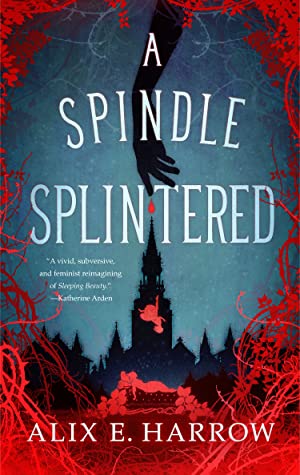 A Spindle Splintered (Fractured Fables, #1) by
A Spindle Splintered (Fractured Fables, #1) by 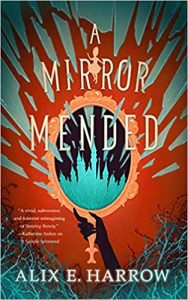 And it’s wonderful – especially when all the Sleeping Beauties carry off the princess and save the day, not just for her, but for each other as well.
And it’s wonderful – especially when all the Sleeping Beauties carry off the princess and save the day, not just for her, but for each other as well. The Dishonored Viscount (Diamonds in the Rough, #8) by
The Dishonored Viscount (Diamonds in the Rough, #8) by  While I haven’t loved any of the series quite as much as I did the very first book,
While I haven’t loved any of the series quite as much as I did the very first book,  That she and Marcus will have to stay in the country – properly chaperoned of course – for an entire month has no bearing on her plans when the scheme takes flight. But by the time her father finds her and returns her to London, her view of the world and her future in it has changed.
That she and Marcus will have to stay in the country – properly chaperoned of course – for an entire month has no bearing on her plans when the scheme takes flight. But by the time her father finds her and returns her to London, her view of the world and her future in it has changed. The men in her life, not so much.
The men in her life, not so much.